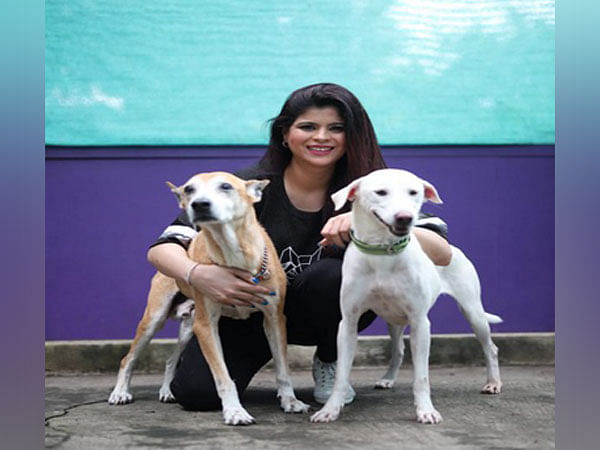
New Delhi [India], November 1 (ANI/ India PR Distribution): Pooja Advani’s day begins with her checking up on her guests. Then comes the bitter-sweet bit – check-ins and checkouts. Waving goodbye to those who’ve come to become friends, and saying hello to new and enthusiastic wet noses and wagging tails.
Now would probably be a good time to mention that Advani is the founder of Doggiie Dog World – a luxurious pet wellness centre in Andheri, Mumbai, that offers a range of services, tailor-made keeping in mind each pet’s mental and physical health.
Advani is one of the few people who can proudly say that she is living her childhood dream. “I dreamt of living in a house full of animals. And that’s exactly what I’m doing now,” says the canine behaviourist. Her establishment is comprised of a three-story bungalow, along with a compound that is spread across 2,500 square feet. “We have a boarding facility for pets, but along with that we feed a bunch of what we call “visiting strays” around us”
But how did Advani manage to realise her dream?
“It took more than a while for the pieces to fall into place, but when they did, it seemed almost serendipitous,” says Advani.
Advani was a BMM student, who decided to foray into jewellery designing, but despite having a successful career, she would somehow always feel like she was meant to do something more. “So, I did what most people do when they can’t narrow down on the next step concerning their career – I decided to do my MBA,” she laughs. But she had a few months to kill before she shifted to Australia to pursue the course, which is when she chanced upon a pet care course in Singapore, and after a gentle nudge or two from her mother, she decided to give it a go. “Caring for animals had after all been a passion of mine since I was a little girl. I would always bring home puppies and kittens that were injured, and needed love and care,” she explains.
And before Advani knew it, the six-week-long course had suddenly turned into four years, and Advani had worked tirelessly in the field to become a certified groomer, canine behaviourist, trainer, hydrotherapist for small animals, and an animal communicator.
While practising in Singapore, Advani had already started working towards DDW, she wanted to use all the international experience she had garnered, to bring about change, closer to home.
“My vision was to create a safe space where pet parents could leave their ‘kids’ for day-care or longer boarding. Having worked in the field for a considerable amount of time, I knew I was equipped to provide for pets, which most pet parents found reassuring,” she explains.
Pet care and the pandemic
Advani describes the pandemic as the most challenging time she has had to wade through professionally. With misinformation about animals being carriers of the virus, more animals were being abandoned than ever before. “I would get over 50 calls every day, and would have to counsel panic-stricken people who weren’t sure about what to do,” she recalls.
And it wasn’t just abandoned animals that needed help, “there were pet parents who were affected by the virus, had to be hospitalised, and didn’t know what to do with their pets. We also had pets in our boarding whose pet parents were stuck in different cities, and some in different countries. That’s when we at DDW stepped up to help in whatever way we could. Being able to board their pets with us, the pet parents were able to focus on their health without worrying about their furry babies,” she explains.
While talking about the kind of care DDW provided animals during the pandemic, Advani says “Animals have a sixth sense; they know when something isn’t right. We made sure the dogs were given mental and physical exercises to help them destress.”
Advani also stresses just how important it is for pet parents to help their pets transition gradually, now that things are slowly getting back to normal.
There was a surge of pet adoptions during the pandemic, but these “pandemic pets” are used to having their parents around all day and are at high risk of experiencing severe separation anxiety when they have to go back to work.
“Start slow,” advises Advani. Start by staying away from your pet for five minutes, once they get used to it, gradually increase the time interval. “Normalcy also means that noise levels will increase, as will the traffic on the streets, which can scare pets who aren’t used to this,” she adds.
In such situations, she suggests you take baby steps with your pet. Linger at the main door for a few minutes, a couple of times a day. Once your pet is comfortable with that, you can walk with them for a couple of metres, and keep increasing the duration of the walk as and when you see the pet feeling comfortable. “The key is to not force your pet to do something they’re not comfortable with. It is a lot of work, but that’s a responsibility you take on when adopting a pet. The one thing that I tell people looking to adopt is ‘Go ahead if you’re ready to be a toddler’s parent for close to 15 years,'” she signs off.
This story is provided by India PR Distribution. ANI will not be responsible in any way for the content of this article. (ANI/India PR Distribution)
This story is auto-generated from a syndicated feed. ThePrint holds no responsibility for its content.




